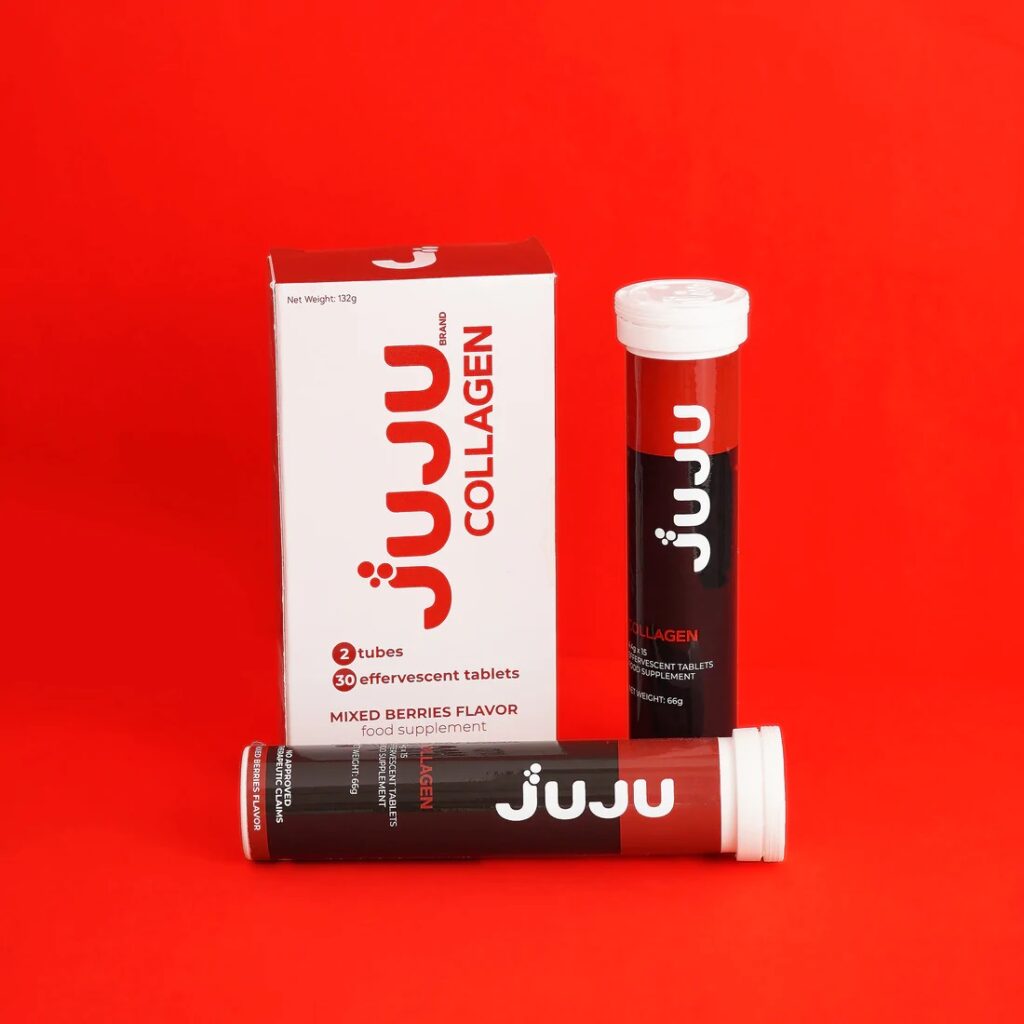A protein called collagen keeps our skin elastic and silky. It is also one of the most prevalent proteins in our bodies and is present in all parts of the body, including the muscles, tendons, and hair. In order to support joint health or other regions where collagen is lost as we age, collagen supplements have gained popularity.
It is well known that your collagen levels begin to decline around the age of 25. This is partly because hormonal changes that cause the skin to become drier and less elastic as we age cause our skin to wrinkle. The main protein that makes up the matrix that gives the skin strength and flexibility is collagen. Many individuals are unaware of the important complementary roles that Vitamin C and Hyaluronic acid can play in your skincare regimen when used in conjunction with collagen. Experts in health and skincare frequently recommend using Vitamin C, Hyaluronic Acid, and Collagen together as the “perfect three” for beautiful skin.
The body naturally produces hyaluronic acid, which is present in skin, hair follicles, cartilage, connective tissue, and bones. Retaining water is its primary purpose in order to keep your tissues lubricated and moist. Hyaluronic acid is consumed by many individuals as a supplement, but it is also found in many other goods, including topical serums, eye drops, and injections. Your skin contains about half of your body’s hyaluronic acid, which binds to water to aid with moisture retention. It has been demonstrated through science that hyaluronic acid could:
One of the most efficient and safest nutrients is Vitamin C. Due to its crucial function in the body’s normal collagen synthesis, Vitamin C has been demonstrated to prevent the telltale signs of ageing. In some situations, it lessens the appearance of wrinkles and aids in the healing of damaged skin. Additionally, Vitamin C is an antioxidant — shielding skin cells from the harmful free radicals brought on by UV radiation. Vitamin C is an essential chemical for the health of the skin because of its antioxidant capabilities and its role in the production of collagen.
In fact, combining these two could improve the health of your skin even more than just taking one of the supplements without the other.
Our bodies naturally contain the protein collagen. Because it makes up more than 80% of human connective tissues, it is also referred to as the most abundant protein in the body. Collagen helps maintain our skin elasticity and smoothness which makes it simpler for us to recover from injuries and other pressures that we may encounter in life.
When exposed to severe surroundings like UV rays or extremely cold temperatures, Vitamin C helps our body make collagen more quickly. But since the two are so similar, many people frequently confuse the two!
So to better understand how these two work together, do not perceive Vitamin C and Collagen as two skincare contenders that are competing which one is better than the other. Instead, see them as the team players that they are — always working together and efficiently performing their respective roles to give you the best skin condition you could have!

Vitamin C is essential for maintaining and producing collagen. Vitamin C is essential for the production of collagen, which reduces the appearance of aged skin by holding collagen fibres together. That is how your skin’s health would be improved more by combining collagen and vitamin C than by taking either one separately.
That is why our best-selling Juju Collagen with Vitamin C Mixed Berry flavour is one of the products that has 100% Daily Value Vitamin C and Collagen in every serving.
The body needs proline and glycine, among other amino acids (which serve as the building blocks of proteins like collagen), as well as the minerals copper and zinc and, most importantly, Vitamin C in order to produce collagen.
By encouraging the growth of fibroblast-producing cells, Vitamin C aids in the creation of collagen. Skin cells called fibroblasts secrete collagen, which aids in the production of the fibrous connective tissues that keep our skin and joints flexible and healthy.
Vitamin C is regarded as a crucial cofactor in the creation of collagen because fibroblasts produce collagen and it is necessary for their growth and health. In other words, without Vitamin C, fibroblasts wouldn’t exist, and fibroblasts wouldn’t exist without collagen.
Additionally, because Vitamin C is an antioxidant, it aids in defending collagen from the negative effects of free radical damage. Free radicals are oxygen molecules that are inherently unstable and circulate throughout the body looking for extra electrons to help them become stable once more.
They can result in cellular and DNA damage, as well as collagen breakdown. Antioxidants like vitamin C help squelch free radicals. They also aid in mending damaged DNA strands that “code” for collagen formation.
As a water-soluble vitamin, vitamin C cannot be stored by the body. As a result, we must include it in our food on a daily basis. Any excess is then excreted in the urine. It is consequently advantageous for collagen formation to consume a diet rich in Vitamin C with foods such as citrus fruits and juices, berries, peppers, broccoli, and potatoes.
In PubMed, searching for “Vitamin C and Collagen” returns 1,971 results. The benefits of combining these two substances have been thoroughly studied. This study demonstrates how Vitamin C prevents the auto-inactivation of specific collagen enzymes that are essential for collagen formation, maintaining a normal mature collagen network. Due to its crucial function in collagen synthesis and the fact that vitamin C promoted the creation of collagenous proteins, this study emphasizes the importance of Vitamin C for wound healing. Last but not the least, further research on the relationship between Vitamin C and skin hydration, wound healing, wrinkle reduction, and improved inflammatory skin conditions should definitely refer to this metaanalysis.
Make sure the natural health product you purchase is of the highest calibre, including collagen and Vitamin C supplements. The collagen you use should be a pure, one-component formula made from grass-fed, pasture-raised cattle that is free of all hormones, antibiotics, GMOs, and gluten. To be sure this is the case, look at the ingredient list. Your Vitamin C supplement should only contain natural ingredients.
As was already noted, several research have revealed that vitamin C increases the production of collagen, which may have an anti-aging impact.
Fibroblasts, cells present in connective tissue, were examined in an in vitro experiment alongside those from elderly adults between the ages 80 and 95. Collagen proteins are secreted by fibroblasts and aid in maintaining the structural integrity of bodily tissues.
Before any supplementation in this study, the aged cells reproduced at a pace that was one-fifth of the newborn cells. However, the elderly cell culture reproduced six times more quickly than the typical newborn fibroblasts when Vitamin C was given. Vitamin C supplementation also caused the old cells to produce twice as much collagen.
This shows that consuming Vitamin C along with collagen can speed up the body’s cells’ ability to synthesize it, which may also have an anti-aging impact by hastening the replacement of old cells with new ones.
Combining collagen and vitamin C may help to keep skin healthy and hasten recovery. Vitamin C deficiency causes the collagen made by fibroblasts to be unstable, which makes tissue healing less effective and causes wounds to heal more slowly.
There is some proof that consuming Vitamin C along with zinc and arginine (an amino acid included in collagen) may hasten the healing of pressure ulcers or possibly stop them from ever occurring.
Vitamin C and Collagen supplements are always associated with skincare regimens. But did you know that it is also very beneficial in supporting your daily physical activities by giving you healthy joints?
The tissue that covers the surface of your joints and protects them from wear and tear is called cartilage, and collagen helps keep it healthy.
You have a higher chance of acquiring diseases like osteoarthritis as you get older and your body produces less collagen. Additional research backs up the theory that patients with osteoarthritis may benefit from hydrolyzed collagen.
According to the findings of one study, “hydrolyzed collagen has a good therapeutic effect on osteoporosis and osteoarthritis, with a potential rise in bone mineral density, a protective effect on articular cartilage, and particularly in the symptomatic reduction of pain.”
Having said that, as Vitamin C is known to speed up the synthesis of collagen, using collagen with vitamin C is a smart option.
According to a study, taking a collagen supplement may have important advantages for your hair and nails. For eight weeks, 54 women between the ages of 26 and 68 consumed an oral supplement comprising collagen and hyaluronic acid. By the end of the trial, the results revealed a significantly improved state of skin moisture and nail and hair health.
There is some evidence to support the claim that taking a collagen supplement promotes hair and nail growth while preventing thin, brittle nails.
With that, consider one of our premium, flavor-adjustable hydrolyzed collagen supplements if you’re thinking about taking a collagen supplement.
Preclinical research has suggested that taking a vitamin C supplement may hasten the healing of broken bones, boost collagen production, and lessen oxidative stress in the body.
The trials backed the use of vitamin C to speed tendon, bone, and ligament transplant recovery. In three of the four trials on fracture healing, Vitamin C-taking groups showed an acceleration or increase in collagen synthesis compared to the control groups.
Effervescent collagen is a collagen supplement containing nutrients for strong hair, skin, nails, and joints that have been approved by nutritionists. When it comes into contact with water, it is intended to emit carbon dioxide, accelerating their breakdown. The tablets entirely disintegrate in a matter of minutes, releasing the medication into solution.
The best time to take collagen is first thing in the morning on an empty stomach or with meals if you have digestive or intestinal troubles. It is also an ideal time to take collagen right before bed to promote undisturbed sleep.
Daily collagen supplements have been demonstrated in studies to increase bone density, halt the ageing process that makes bones brittle, and stimulate the growth of new bone. For older people, oral collagen supplements have been demonstrated to increase skin moisture and suppleness. They might also aid in wrinkle reduction.
It is safe to utilise collagen peptides in doses of up to 10 grams per day for up to 5 months.
The optimal type of collagen for ingesting is typically thought to be collagen peptides. If someone wishes to take a collagen supplement, they ought to take hydrolyzed collagen.
Hydrolyzed Collagen has been reduced to tiny peptides, which makes it easily digestible by the body.
Collagen and vitamin C are the two key elements to seek for in skin care products if you want to get the best results possible. You should strive to combine the two if at all possible because both of them will offer significant advantages for your skin. It’s even better if your collagen contains sodium hyaluronate, a type of hyaluronic acid that will increase its absorption into your skin.



© 2023, Juju Health & Wellness Blog Powered by WordPress